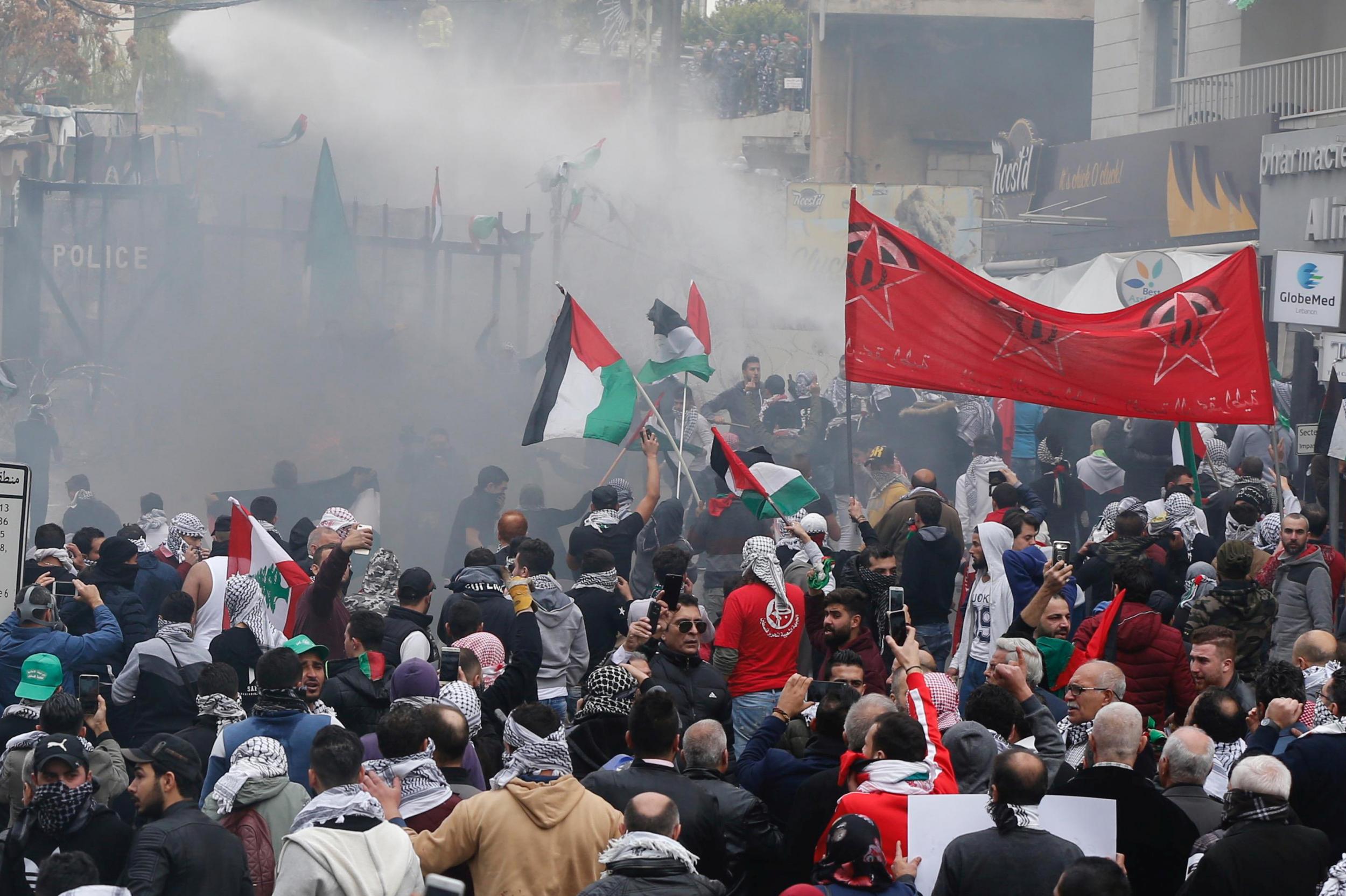Lebanese police fire on anti-Trump protesters outside US embassy with tear gas and water cannon
Demonstration erupts in Beirut over White House decision to recognise Jerusalem as Israel's capital

Your support helps us to tell the story
This election is still a dead heat, according to most polls. In a fight with such wafer-thin margins, we need reporters on the ground talking to the people Trump and Harris are courting. Your support allows us to keep sending journalists to the story.
The Independent is trusted by 27 million Americans from across the entire political spectrum every month. Unlike many other quality news outlets, we choose not to lock you out of our reporting and analysis with paywalls. But quality journalism must still be paid for.
Help us keep bring these critical stories to light. Your support makes all the difference.
Lebanese security forces have fired tear gas and water canons at protesters near the US Embassy in Beirut during a demonstration against Donald Trump's decision to recognise Jerusalem as Israel's capital.
Demonstrators waved the Palestinian flag as they lit fires in the street and threw projectiles towards the security forces, who had barricaded the main road leading to the embassy in the Awkar area of the capital's north-east.
Some protestors burned an effigy of the US President, as well as American and Israeli flags and piles of garbage, sending plumes of smoke into the air. As they hurled stones, security forces responded with tear gas and water cannons, TV footage showed.
Lebanon is home to 450,000 Palestinian refugees, amounting to nearly 10 per cent of the population.
The White House announcement on Jerusalem this week has ignited protests across the Middle East, where it is widely seen as a blatantly pro-Israel move that threatens the decades-old peace process.
Washington had long held that the city's status must be decided in negotiations with the Palestinians, who want East Jerusalem as the capital of their future state.
The protests in Lebanon came as 10,000 people rallied outside the US Embassy in the Indonesian capital of Jakarta on Sunday, and followed three days of demonstrations in Gaza, the West Bank and East Jerusalem.
Four Palestinians have been killed by Israeli air strikes after rockets were fired across the border from Gaza.
Addressing protesters in Beirut, the head of the Lebanese Communist Party Hanna Gharib declared the United States "the enemy of Palestine". He called for the closure of the US Embassy, which he said was a "a symbol of imperialist aggression".
The country's government has condemned Mr Trump's decision, which Lebanese president Michel Aoun warned was a threat to the stability of the Middle East.
The powerful Lebanese Shi'ite group Hezbollah has called for a new Palestinian uprising against Israel in response to the US decision. Hezbollah leader Sayyed Hassan Nasrallah also called for a protests in Hezbollah-controlled southern suburbs of Beirut.
Lebanon's foreign minister Gebran Bassil, speaking at an emergency meeting of Arab foreign ministers on Saturday, suggested nations should also consider imposing economic sanctions against the US to stop it moving its Israel embassy from Tel Aviv to Jerusalem.
"Pre-emptive measures [must be] taken ... beginning with diplomatic measures, then political, then economic and financial sanctions," he said.
The 22-state Arab League, which includes several close US allies, said it would seek a United Nations Security Council resolution rejecting the US decision to recognise Jerusalem as Israel's capital.
"The decision has no legal effect... it deepens tension, ignites anger and threatens to plunge region into more violence and chaos," said the group's resolution, issued at 3am local time after hours of meetings that began on Saturday evening.
But the Arab League statement made no mention of economic sanctions and included no other punitive actions against the US, such as a boycott of American products or downgrading of ties with Washington.
Subscribe to Independent Premium to bookmark this article
Want to bookmark your favourite articles and stories to read or reference later? Start your Independent Premium subscription today.
Join our commenting forum
Join thought-provoking conversations, follow other Independent readers and see their replies
Comments